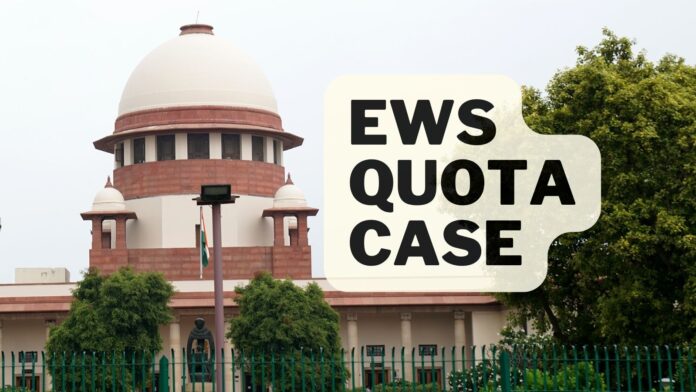The Supreme Court said it would reserve judgment on any appeals regarding the legality of the 10% quota for candidates from the Economically Weaker Section (EWS) in higher education and employment.
A group of petitions contesting the 103rd constitution amendment passed by Parliament were being heard by a five-judge constitution bench presided over by Chief Justice of India UU Lalit. This amendment established financial standing-based reservations for employment in the public sector and enrollment in government colleges.
Academician Mohan Gopal began the case’s arguments before the court on September 13 and opposed the EWS quota amendment, calling it “deceitful and a backdoor attempt” to abolish the idea of reservation. The bench also included Justices Dinesh Maheshwari, S Ravindra Bhat, Bela M Trivedi, and J B Pardiwala.
Senior attorneys like Ravi Verma Kumar, P Wilson, Meenakshi Arora, Sanjay Parikh, and K S Chauhan, as well as attorney Shadan Farasat, criticized the quota, claiming it excluded the poor who fall under the categories of Scheduled Castes (SCs), Scheduled Tribes (STs), and Other Backward Classes (OBCs), and that this violated the idea of the “creamy layer.”
Senior attorney Gopal Sankaranarayanan endorsed the EWS quota plan, arguing that it was “long overdue” and a “good start in the right direction,” speaking on behalf of the NGO “Youth for Equality.”
Up to 40 petitions were examined by the highest court, and the majority of them, including the main one brought by “Janhit Abhiyan” in 2019, disputed the legality of the Constitution Amendment (103rd) Act 2019.
The Central Government had submitted a number of petitions asking for the transfer of outstanding cases contesting the EWS quota rule from different high courts to the Supreme Court for a conclusive ruling.
On September 8, the bench created three main issues for determination in response to the arguments made against the Center’s decision to give EWS 10% preference in admissions and employment.
The bench had stated that all the features relevant to the petitions on the constitutional legality of the decision to grant the reserve were “broadly” encompassed by the three concerns identified by the attorney general for the decision.
The first question was asked, “Whether 103rd Constitution Amendment Act can be deemed to violate fundamental principles of the Constitution by allowing the State to establish exceptional measures, including reservations, based on economic grounds.”
When ruling in the Keshavananda Bharati case (1973), the Supreme Court introduced the idea of basic structure. It was determined that the Constitution could not be revised in its entirety and that some provisions, including the rule of law, the separation of powers, and judicial freedom, were part of the “fundamental structure” and could not be changed. Through the 103rd Constitutional Amendment Act of 2019, the Centre established the provision for EWS reservations in admissions and public services.
Over the course of seven days, the Supreme Court heard arguments from about 20 attorneys. Before CJI Lalit’s scheduled resignation on November 8th, the case’s verdict to be announced. Three questions had been set out for discussion by the panel, which also included Justices S Ravindra Bhat, Dinesh Maheshwari, SB Pardiwala, and Bela Trivedi.






